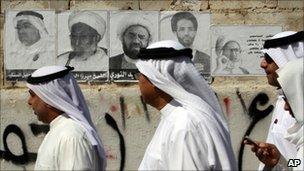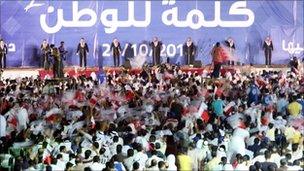Bahrainis vote in parliamentary election
- Published

Bahrain's lower house of parliament only holds restricted powers
An election has been held in Bahrain for the lower house of parliament, the third such vote since it became a constitutional monarchy.
Correspondents say the main contest is between Islamists and those with a more secular vision for the Gulf state.
The election comes amid rising tension between the dominant Sunni Muslim community and majority Shia Muslims.
The government has also been criticised for arresting dissidents and curtailing media and internet freedom.
Observers will also be watching to see if Bahrain's only woman in parliament is joined by other female MPs.
Although women got the right to vote in 2001, strong discrimination against their participation in Bahraini politics still exists. The main Islamist parties are unwilling to back women candidates.
Polls closed at 2000 (1700GMT) with an estimated turnout of at least 67%, according to Justice Minister Sheikh Khaled bin Ali al-Khalifa, who heads the electoral commission.
Results are expected on Sunday.
'Second-class' Shia
The BBC's Middle East correspondent, Jon Leyne, says the Kingdom of Bahrain is one of the more democratic countries in the Arab world.
But it is a limited democracy, he adds, with the elected members of the lower house, the Council of Representatives, only holding restricted powers.
The upper house, the Shura Council - all of whose members are appointed by the royal family - can and does over-rule the lower house, and is a major source of complaints by democracy campaigners and opposition politicians. In addition, King Hamad appoints all ministers without parliamentary scrutiny.
Our correspondent says the main election contest will be between Islamists, and those politicians with a more secular outlook.
The Islamists want measures such as limits on the sale of alcohol. Others say that would damage Bahrain's aim to be a global financial centre.
The long-running conflict between the Shia majority and the ruling Sunni minority has also once more come to the fore, with a series of protests by Shia complaining about their "second-class" status.

Shia politicians have called for an end to the Sunni minority's monopoly on power
On Wednesday, the leader of the main Shia opposition al-Wifaq al-Watani (National Accord) Islamic Society called for an end to the monopoly on power the Sunni ruling family has had since independence in 1971.
"It is unacceptable that power be monopolised by a single family, even one to which we owe respect and consideration," Sheikh Ali Salman told a rally in a suburb of the capital, Manama.
"We look forward to the day when any child of the people, be they Sunni or Shia, can become prime minister," he added.
King Hamad's uncle, Sheikh Khalifa bin Salman Al Khalifa, has served as prime minister ever since Bahrain's independence from the UK in 1971.
Sheikh Salman's comments came after the detention of 250 Shia opposition activists in recent months, some on terrorism charges, according to the human rights group, Amnesty International.
- Published24 October 2010
- Published21 October 2010
- Published23 October 2010
- Published8 September 2010
- Published5 September 2010